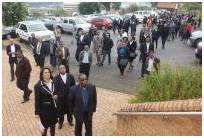
MBABANE – Lawyers have petitioned the Judicial Service Commission (JSC) over the current judicial impasse.
Therefore they have called off their boycott of courts in the country in protest of the judicial crisis.
The boycott had began last week Friday after the lawyers met and resolved not to go to court pending finalisation of filing their concerns against the Chief Justice, Micheal Ramodibedi.
The lawyers also met at the Manzini and Nhlangano Magistrates Courts on Monday and Tuesday. The decision was taken yesterday in their meeting after delivering the petition.
President of the Law Society of Swaziland Titus Mlangeni said the lawyers can resume work in the courts of the country.
This marked an end to the boycott by the learned friends in protest of the breakdown in the administration of justice in the country. There have been calls upon the Chief Justice to leave office following among other issues, his suspension of Judge Thomas Masuku on 12 charges among which is that he insulted His Majesty King Mswati III. The attorneys were first locked in a two-hour meeting that was closed to the media at the Mbabane Magistrates Court.
The over 80 attorneys who braved the chilly weather then moved to the High Court to deliver petitions to the JSC on their complaints about Ramodibedi.
Secretary of the JSC Lorraine Hlophe who also doubles as the Supreme Court Registrar received the petition. She was in the company of Mpendulo Simelane who is the Registrar of the High Court.
Mlangeni thanked the attorneys for a job well done in the meeting they held at the Magistrates Court.
"The boycott has been uplifted from now. You can now (yesterday) move urgent applications if you have so been instructed. We will meet on July 21, 2011 for a briefing on the latest developments following that we have delivered the documents to the JSC," Mlangeni said.
The attorneys elected a sub-committee consisting of senior lawyers to address the issues on their behalf. The sub-committee drafted a letter to the JSC with their complaints against Ramodibedi.
During the lawyers’ boycott, a number of cases were either postponed or removed from the roll due to the unavailability of lawyers.
This was mainly the case for civil matters.
Lawyers plan welcome march for Makhulu Baas
MBABANE – Attorneys are contemplating staging a welcome march for the Chief Justice, Michael Ramodibedi.
A source who was part of the meeting where lawyers uplifted their boycott, said the lawyers have suggested that they should stage the march to welcome Ramodibedi when he returns to the country on July 27, 2011.
The CJ is currently in Botswana where he also sits as a judge for that country’s Court of Appeal.
...fear complaints against CJ may be leaked to media
MBABANE – Lawyers were not made aware of the complaints against the Chief Justice in fear that such would be leaked to the press.
The attorneys were told that they would be informed of the charges once it has been ensured that the Chief Justice Micheal Ramodibedi has received the correspondence containing his charges. A source said the lawyers were told that some of the issues complained about are very sensitive.
The source said they were told that some of them have friends and relatives who work in the media therefore they might be tempted to leak such.
Human Rights Commission calls for order
MBABANE - After a long silence since the judicial crisis came to the forefront in the country, the Commission on Human Rights and Public Administration has broken its silence.
The Commission has called upon all parties involved in the impasse to find prompt and lasting solutions to resolve the crisis.
The Commission’s acting chairman, Sabelo Masuku, said the recent events have tested the country’s respect, tolerance and restraint as a nation with regard to fundamental human rights and freedoms. The Commission said it is concerned about the likely infringement of fundamental rights of the Swazi people which are enshrined in the Constitution.
"The Commission also notes the negative impact that the disruption is likely to have on the current effort by the Government of Swaziland in the intervention on the economic situation of the country. This is critical in the current situation where the country should have a well functioning and undisrupted judicial system to inspire investor confidence," said Masuku.
The Commission went on to caution all those involved in the judicial crisis to observe the constitutional provisions that provide clear guidance on how the right holders are to exercise and enjoy their rights within the confines of the law.
"Similarly, the duty bearers have the responsibility to ensure the proper functioning of the courts," concluded Masuku.
